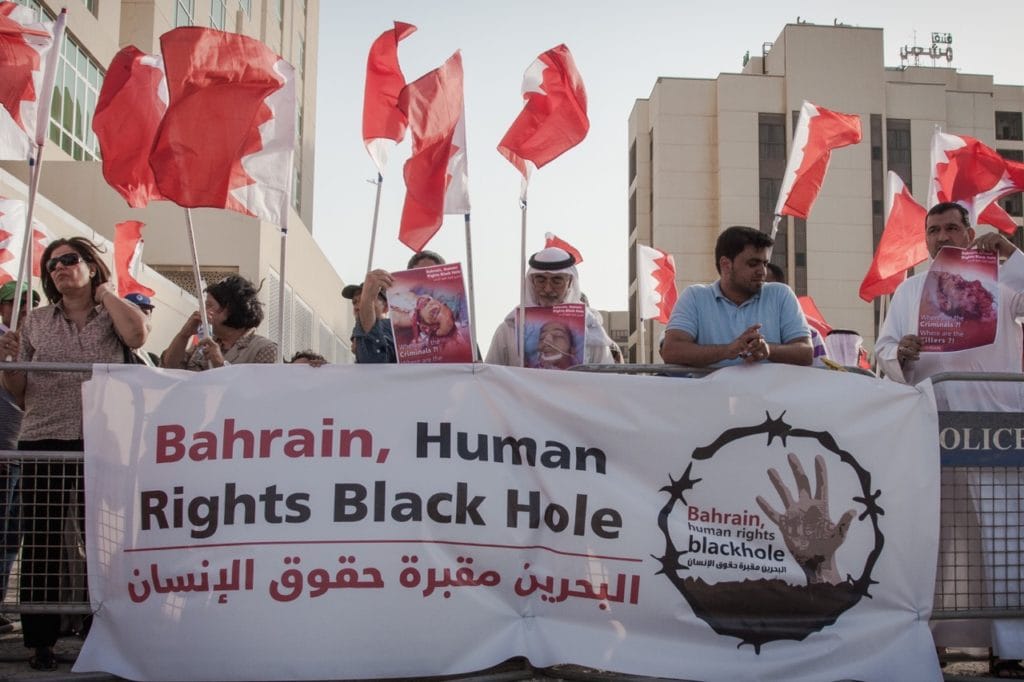Manama’s disturbing human rights record has raised particular concerns among rights groups.
Bahrain’s Football Association [BFA] condemned Qatar’s “abuse and exploitation” of expats working in 2022 FIFA World Cup construction sites in a statement released on Sunday.
The BFA pointed to reports issued by rights groups detailing abuses of migrant workers, namely Amnesty International’s latest findings.
“Reports and figures confirm that the steps taken by the State of Qatar are insufficient to protect the rights of workers and improve their conditions”, said the BFA’s statement, calling for the protection of migrant workers from exploitation in Qatar.
The association’s statement coincided with the one-year countdown until the long-anticipated sporting event in Qatar, which is set to be the first country in the Middle East to host the World Cup.
It also came as Bahrain continues its human rights abuses against dissidents and the Shia population in the country.
Bahrain has been criticising Qatar in recent months despite the signing of the Al-Ula Declaration this year, which saw the end of a three-year blockade on Doha imposed by Manama, Riyadh and Abu Dhabi in 2017.
Speaking to Doha News, David Haigh, human rights lawyer and former Managing Director of Leeds United FC, said that the BFA’s denunciation is more politically and diplomatically driven.”
Qatar has allowed respected international NGOs like Human Rights Watch and Amnesty International into the country, as well making significant moves forward to address such issues, much more than other Gulf nations,” said Haigh.
He also said that Bahrain’s comments are “both absurd and the height of audacity” given its ongoing human rights abuses and as a country that does not shrug off criticism of those violations.
“Needless to say, one death or injury on a world cup construction site in any country is one too many. But any criticism should be balanced, and sadly I expect we will see more politically motivated attacks on Qatar from Bahrain, the UAE, Saudi Arabia and other states with blood on their hands,” noted Haigh.
Disturbing human rights record
The kingdom has come under global spotlight since the 2011 uprisings erupted during the region-wide Arab Spring. A decade later, rights groups say Bahrain is still continuing its human rights violations on freedom of expression.
Qatar welcomes ILO report on work-related incidents amid calls for transparency
Recent investigations by Al Jazeera revealed that at least 607 children in Bahrain have suffered from abuse and harsh interrogation carried out without the presence of their parents or lawyers.
A recent Human Rights Watch [HRW] report dismissed denials by the Bahraini government on rape threats and physical torture of four boys aged 15-to-17 years in detention in late 2020.
Among the cases that sparked global condemnation was the arrest of former Bahrain national team footballer Hakeem Al-Araibi, who was arrested in 2018 at the age of 25 during his honeymoon in Bangkok based on an Interpol “red notice” from Manama.
Al-Araibi fled Bahrain in 2014 following accusations of vandalism during the Arab Spring and was sentenced in absentia to 10 years in prison. He repeatedly denied those charges and was later released in 2019.
“It is entirely inappropriate for Bahrain to lecture any other state on human rights.
The 2022 world cup should be a feather in the cap of the Arab world and especially Qatar,” said Haigh, pointing towards Al-Araibi’s arrest.
Qatar’s historic reform
Qatar has been under global criticism since becoming the first country in the Middle East to win the bid to host the World Cup in 2010.
This prompted Doha to take major steps in ensuring the protection of migrant workers from all sorts of abuses and exploitation by their employers.
Amnesty report provides ‘Reality Check’ on loopholes in Qatar’s labour reforms
Among the positive developments Qatar has made since winning the bid to host the global sporting event was becoming the only country in the region to host the International Labour Organization’s [ILO] office, a move that is seen as proof of Doha’s commitment to addressing concerns raised over rights abuses.
Qatar also drastically enhanced monitoring across the board to detect violations, enacting swifter penalties and further strengthening the capacity of labour inspectors.
According to recent numbers provided by the Government Communications Office [GCO], 35,280 accommodation and worksite inspections were carried out in the first half of this year alone, which saw the issuance of 13,724 penalties to companies deemed to be in violation of Qatar’s labour laws.
Recently, the ILO’s report One is Too Many revealed that some 50 workers died in Qatar and over 500 were severely injured, whereas 37,600 suffered mild to moderate injuries.
The report also mentioned a set of recommendations “that can serve as a road map for action,” said Max Tuñón, head of the ILO Project Office in Qatar.
Qatar’s Ministry of Labour welcomed the ILO’s report and confirmed recommendations are being reviewed.
2022 World Cup Chief Executive Nasser Al-Khater said on Saturday the host nation has been “unfairly treated and scrutinised” for years, referring to criticism over its human rights record.
Al-Khater said that more credit should be given to what he described as Qatar’s “extraordinary” progress, which saw the introduction of a minimum wage, the dismantling of the sponsorship (kafala) system, and improvements to working and living conditions of migrant workers.
Follow Doha News on Twitter, Instagram, Facebook and Youtube







